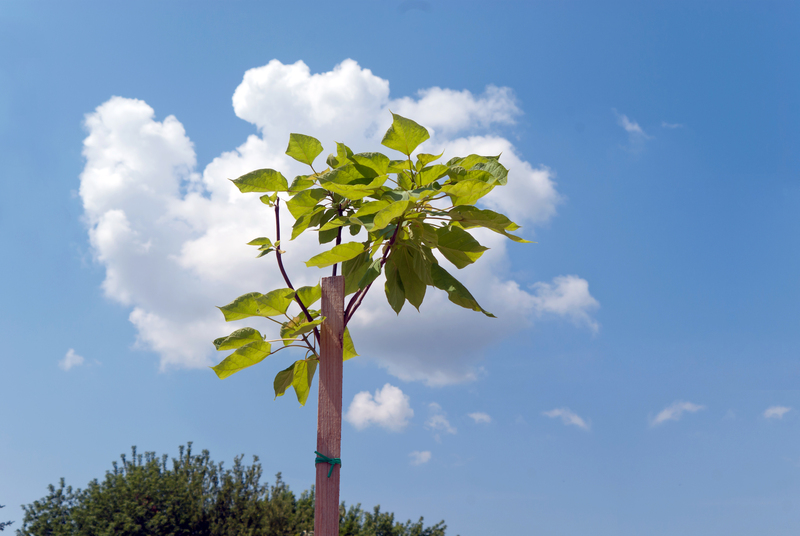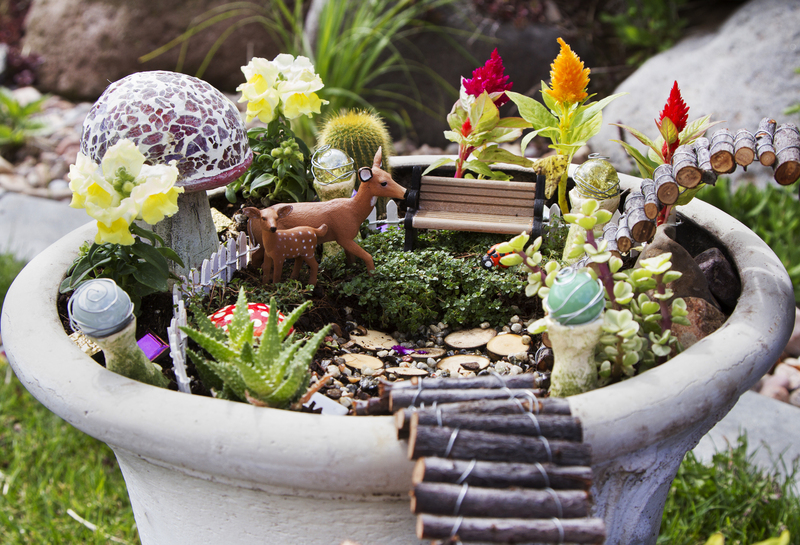Breathe Life into Soil Through Organic Waste Recycling
Posted on 30/06/2025
Breathe Life into Soil Through Organic Waste Recycling
Organic waste recycling is more than just an eco-friendly practice--it's a powerful way to rejuvenate soil, supporting both environmental sustainability and thriving gardens. If you're passionate about cultivating greener spaces, or want to reduce your waste impact, learning how to breathe life into soil by recycling organic waste is essential.
Why Recycle Organic Waste?
The majority of household and garden waste is biodegradable. When properly recycled, organic materials decompose into rich humus full of essential nutrients. This process not only enriches the soil but also reduces landfill usage and cuts greenhouse gas emissions. Recycled organic waste is a natural food for your crops and plants, working wonders far beyond commercial fertilizers.
- Reduces landfill dependence--saving space and minimizing harmful emissions.
- Enriches soil structure--creating a better habitat for beneficial microbes.
- Retains soil moisture--lowering water consumption for irrigation.
- Promotes healthier plants thanks to full-spectrum nutrients.
The Journey of Organic Waste: From Kitchen to Soil
Every day, households generate a significant amount of organic waste, from vegetable peels to coffee grounds. Rather than letting these items rot in landfills, recycling them transforms their potential, offering new life to gardens and farmlands.
- Kitchen scraps: Fruit and vegetable peelings, eggshells, coffee filters
- Yard trimmings: Grass, leaves, prunings, and even weeds before they seed
- Paper products: Unbleached napkins, paper towels, newspaper (in moderation)
When these materials are sent to compost bins or local recycling centers, they're broken down by worms, bacteria, and fungi into nutrient-dense compost. This finished compost, also called "black gold," is then returned to the earth, revitalizing depleted soils and supporting robust plant growth.

Benefits of Recycled Organic Waste for Soil Health
Soil is a living ecosystem, teeming with microbes, roots, and organic matter. Recycling organic waste improves the quality and fertility of soils in several profound ways:
- Enhanced Nutrient Levels: Compost contains macro and micronutrients, including nitrogen, potassium, and phosphorus. These are slowly released into the soil, providing a steady food source for plants.
- Improved Soil Texture: Soils treated with recycled organic waste have better structure. They're crumbly, easy to work, and hold moisture while draining excess water effectively.
- Disease Suppression: Healthy, microbe-rich soil can help suppress common plant diseases, making your garden more resilient without chemical interventions.
- Increased Biodiversity: The introduction of compost encourages earthworms and beneficial insects, creating a balanced ecosystem.
Composting: Breathing Life Back Into Your Soil
At the heart of organic waste recycling lies the composting process. Whether in a simple backyard pile or a sophisticated community operation, composting is the art of turning waste into a resource.
Step-by-Step Guide: How to Recycle Organic Waste at Home
1. Gather the Right Materials
A successful compost pile needs a balance of "greens" (nitrogen-rich materials) and "browns" (carbon-rich materials). Here's how to get started:
- Greens: Vegetable peelings, fruit scraps, coffee grounds, fresh grass clippings
- Browns: Dry leaves, shredded cardboard, sawdust, straw
2. Build Your Compost Bin
Compost bins keep your pile tidy and assist with proper aeration. You can use:
- Store-bought compost tumblers for simple turning and minimal mess
- DIY wooden or wire bins for larger gardens
- A simple heap in an unused garden corner can also work if space allows
3. Layer and Maintain the Pile
- Start with a layer of browns, add a layer of greens, and alternate as more materials are added.
- Keep the pile moist but not soggy--it should feel like a wrung-out sponge.
- Turn the pile weekly to provide oxygen, which speeds up decomposition and prevents odors.
4. Harvest and Apply Your Compost
Depending on conditions and care, your compost will be ready in 2-6 months. Finished compost is dark, crumbly, and smells earthy. Spread it:
- As a top dressing for garden beds
- Mixed into potting soil for container plants
- To revitalize lawns and flower beds
Advanced Organic Waste Recycling Techniques
For those looking to go beyond backyard compost piles, several advanced techniques offer further benefits and efficiency in recycling organic waste:
Vermicomposting: Letting Worms Work Wonders
A vermicompost system uses red worms (Eisenia fetida) to break down food scraps quickly, producing worm castings--a nutrient-packed resource for your soil. Vermicomposting is perfect for those with limited outdoor space.
- Quick decomposition--harvest castings every 2-3 months
- Odor-free--well-managed bins rarely produce bad smells
- Suitable for indoors--ideal for apartments or urban homes
Bokashi Composting: Fermenting Food for the Garden
Bokashi is a Japanese method that ferments organic waste using special inoculated bran. This anaerobic process is efficient for meat and dairy scraps, which traditional compost bins can't handle.
- Handles a variety of waste--meat, dairy, and cooked foods included
- Minimal space required--works in small kitchen bins
- Pre-digested waste is easily buried in the garden, enriching soil faster
Municipal Organic Waste Recycling Programs
Many cities now offer curbside organic waste recycling. Residents can drop food and yard waste into designated bins, which are collected and processed at commercial composting facilities. The finished compost is then used in public parks, landscaping, and sold to local farmers.
Common Mistakes to Avoid When Recycling Organic Waste
Even well-intentioned gardeners make some errors when starting out. Here's what to avoid to ensure your soil rejuvenation efforts succeed:
- Adding too much of one thing: Balance greens and browns for optimal breakdown.
- Letting the pile dry out: Compost needs consistent moisture to decompose.
- Neglecting aeration: Turn regularly to prevent anaerobic conditions and odors.
- Including the wrong items: Avoid meat, greasy foods, invasive weeds, and diseased plants in regular composting methods.
- Ignoring pests: Covering food scraps with browns or soil deters rodents and flies.
Environmental and Community Impact of Organic Waste Recycling
The widespread adoption of organic waste recycling doesn't just benefit personal gardens--it plays a significant role in global sustainability. Here's how:
- Reduces Methane Emissions: When organic matter decomposes anaerobically in landfills, it produces methane, a potent greenhouse gas. Composting slows climate change by diverting waste from landfills.
- Builds Food Security: Healthy soils generate higher yields and better-tasting food, supporting urban gardening and local farm initiatives.
- Strengthens Community Ties: Community composting projects bring neighbors together, turning shared waste into shared abundance.
Case Studies: Organic Waste Recycling in Action
Across the world, examples abound of how soil revitalization through organic waste recycling transforms communities:
- San Francisco, USA: The city's comprehensive organics recycling program diverts over 650 tons of waste daily. Processed compost enriches urban farms and gardens.
- Bangalore, India: Local initiatives turn market waste into compost, reducing landfill loads and providing fertilizer for area farmers.
- Rural France: Community members create shared composting spaces, promoting sustainable agriculture and reducing chemical use.
Frequently Asked Questions about Organic Waste Recycling and Soil Health
Can I compost all kitchen waste?
Most fruit and vegetable scraps, coffee grounds, tea bags (without plastic), and eggshells are great for composting. Avoid cooked foods, dairy, and meat in open piles, as they attract pests and take longer to break down.
How long does it take for organic waste to turn into compost?
With regular turning and the right moisture, compost is ready in 2-6 months. Faster results come from smaller, well-aerated bins and balanced materials.
Is compost safe for all plants?
Yes--finished compost is gentle and packed with nutrients. Work it into vegetable beds, around trees, or in flower gardens for broad benefits.
What if my compost pile smells bad?
A healthy compost pile should smell earthy. Unpleasant odors suggest too much green material or poor aeration. Add more browns and turn your pile to regulate.

Getting Started: Small Steps with Big Impact
To breathe life into your soil through organic waste recycling, start simple:
- Designate a kitchen container for daily scraps.
- Set up a basic outdoor compost heap or join a community composting program.
- Learn what can and can't be composted for optimal results.
Each banana peel or coffee filter you recycle is a step closer to lush, vibrant soil and a cleaner planet.
Conclusion: Revitalize Earth with Every Scrap
The movement to breathe life into soil with organic waste recycling is about more than gardening--it's about stewardship, climate action, and nourishing the very ground beneath our feet. By transforming everyday waste into thriving landscapes, we all have the power to create greener, healthier communities.
Start recycling organic waste today--your soil, your health, and your planet will thank you for generations to come.
Latest Posts
Arm Your Garden Against Nature's Tempests
Optimize Your Garden with These Indispensable Tools
How to Winterize Your Garden Plants for Survival



